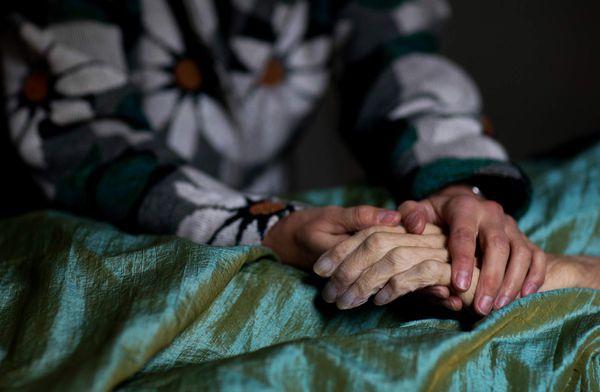Eye For Film >> Movies >> Dead Good (2018) Film Review
Dead Good
Reviewed by: Jennie Kermode

In 1963, Jessica Mitford's landmark in investigative journalism The American Way Of Death took on the commercialisation of the funeral business and revealed the way that, in just a few short decades, people had come to take for granted an array of expensive and often exploitative 'traditions' that had nothing to do with the way their recent ancestors had dealt with the deaths of loved ones. It was a book that sent ripples across the country and sparked the first movements for change, but even as it did so, those same practices were being exported to other countries, changing what was thought of as normal around the world. They were able to do so because, in many places, talking about death at all remains taboo. It has taken decades for people worldwide to start reclaiming death from commercial enterprises on any significant level. Dead Good meets a group of people who are doing so in Brighton.
Cara set up her funeral practice 20 years ago, after dealing with bereavement herself. Her aim is to provide alternative options for people who don't feel that standard funeral practices are right for them, or who want to be able to have more input into how a loved one is remembered. The polar opposite of the smartly suited undertakers, she dresses casually and chats in a relaxed way to clients who immediately look relieved. One of them apologises for the excitable behaviour of her two dogs. Cara tells her not to worry, she has two of her own: Harold and Maud.

The process of saying goodbye to a loved one is never easy and director Rehana Rose has secured impressive access to three families who let her observe it all, from first discussions of what they want through to the funerals themselves. Each story is different, reflecting their different needs and the personalities of the deceased. “A traditional service would be the one thing she’d come and haunt us about,” say two sisters of their mother, who was a director of stage plays and, one suspects, would have strong feelings about the quality required of such a production. Peter, a parish priest who is happy to conduct any kind of ceremony the bereaved need, also contributes his thoughts and reflects on the importance of helping people find peace.
There is also a reflection on gender, with Cara reminding viewers that caring for the dead has traditionally been women's work in most cultures: “Women go through childbirth, menstruation – gore, you know? So they’re more prepared for it.” There's no suggestion that men should be excluded from the process, rather that it could benefit from women moving back into what has become a heavily male-dominated business. Again, this is about expanding choice. There's an acknowledgement that (though we don't meet any here) some people find it easiest to cope if they have a very formal process in which every decision is made for them. Some need distance. Others need to let their feelings flow.
Peter talks about the period between a death and a funeral, and how many people lack rituals to help them cope with this difficult period. Dead Good is, in itself, a starting point of conversations that might help with this. Why do we shun the subject of death so fearfully? It's clear that the dead loved ones whose stories are told here will be deeply missed, but there's nothing depressing about their funerals, nor about the film. Warm humour balances out sadness. Nobody is under pressure to be cheerful and there are difficult matters to be faced, especially for Gill, whose brother Richard struggled for years before being found dead in a homeless hostel, but everybody seems to find a kind of peace.
Rose's patient, observational style lets her get right to the heart of these very personal matters. In doing so, she creates a safe space for viewers to explore issues they might previously have avoided.
Reviewed on: 28 Feb 2019
















